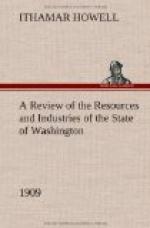The Southeast.
The Blue mountains form the chief natural characteristic of the extreme southeastern section of the state, which constitutes the sixth division. This is comparatively a small district, but one that is highly favored by climatic and soil advantages, and it is well timbered and watered.
The Southwest.
The southwest is the seventh and final division of the state. It comprises an extensive district, fronting on the Columbia river and the Pacific ocean. It is heavily wooded and its chief industries are based upon its timber wealth. The taking and canning of fish and oyster culture are also important industries, while fruit growing and general farming are carried on upon a constantly increasing scale.
[Page 8] natural resources of Washington.
Probably few other states in the Union excel Washington in the great variety, abundance and value of the natural gifts prepared and ripe for the hand of man within its borders. Preceding races were content to leave its wealth to us, being themselves satisfied to subsist upon that which was at hand and ready for consumption with no effort but the effort of taking. The impenetrable forests were to them a barrier to be let alone. For the minerals within the mountains they had no use, and to gather wealth from the tillage of the soil needed too much exertion. Fish and game and fruits all ready to gather were all they sought, and the state had enough of these to attract and hold a large population. But the vision of the white man was different. His eye scanned the peaks of the Cascades with its great eternal white Rainier having its head thrust up among the clouds, and he realized that around and beneath them must be a vast hoard of the precious metals. His eye caught the dazzling grandeur of the white-capped Olympics, but he realized that they held in reserve something more substantial to his needs than scenery and hunting grounds. The impenetrable barriers of the forest-covered foothills were to him a treasure worth the struggle for an empire. He scanned the glittering waters of the bays and inlets of Puget Sound and its great open way to the Pacific Ocean and realized that it meant more to him and to his children than a place to catch a few fish. He viewed the vast plains of “barren” land within the great winding course of the Columbia river and believed it worth more than pasturage for a few bands of ponies.
The thousand tumbling water-falls that hastened the course of the rivers toward the sea meant more than resting places for the chase. No wonder the hardy pioneers whose vision saw the grandeur of Washington and comprehended its meaning dared a mighty journey, vast hardships and trying and dangerous hazards to save this empire to Uncle Sam. Washington, saved by the energy and foresight of a few, has become the [Page 9] delightful home of a million and more, and their possession is one that Alexander or Napoleon would have coveted, had they known.




